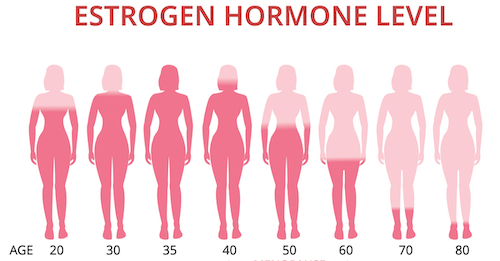Want to know the Nigerian foods high in estrogen?
Then you're in the right place.
Without any further delay,
here are 12 foods with the most Phytoestrogens (dietary estrogen) you can find in Nigeria...
Nigerian Estrogen-rich foods list
Dietary estrogen is gotten from a variety of plant sources including:
1. Berries
Berries are not only impressive for your overall health, but they can also increase your estrogen levels. Particularly Raspberries, Cranberries, and Strawberries [1,2, 3]
In summary, berries are not only rich in vitamins, minerals, and fiber, but are also a great source of plant oestrogens.
2. Garlic
Garlic is well known for its culinary and medicinal properties. However, what is less known is that garlic is a potent estrogen levels booster.
A couple of research studies have shown garlic to positively impact blood estrogen levels and help in the treatment of bone loss caused by estrogen deficiency [4, 5, 6, 7].
Note that most of the research studies are on animals and few on humans.
In summary, in addition to garlic flavour and medical benefits, it is rich in phytoestrogens and may be used in treating bone loss due to estrogen deficiency. However, more research on humans is needed.
3. Nuts
Nuts are another delicious source of phytoestrogen.
Whether eaten raw or roasted, they are sure to deliver some amazing goodies to your body including estrogen.
Some of the nuts with higher phytoestrogen levels include Almonds, cashews peanuts, pine nuts and brazil nuts.
4. Peaches
Peaches are sweet, nutrient-packed and also rich in a type of phytoestrogens referred to as lignans [8].
5. Dried fruits
Dried fruits besides being delicious, rich in fiber, and packed with nutrients, are also potent estrogenic food[9].
Dried Apricots contain the most phytoestrogens, followed by Dates, Dried Prunes and Raisins [10]..
In summary, dried fruits such as dates, apricots, prunes and raisins are great sources of fibre, vitamins, antioxidants and phytoestrogen.
6. Cruciferous vegetables
Cruciferous vegetables are vegetables of the large family Brassicaceae with various textures, flavors, and nutrient profiles. Examples include Cabbage, Cauliflower, and broccoli, among many others.
Cruciferous vegetables, particularly Cabbage, Brussels sprouts, Broccoli and Cauliflower are found to be rich in phytoestrogens, including lignans and coumestrol [11, 12].
7. Flax seeds
Flax seeds contain a high amount of lignans (chemical compounds that act as phytoestrogens)
It is interesting to know that flax seeds contain up to a whopping 800 times more lignans than any other plant foods [13, 14].
What's more interesting is that studies have linked phytoestrogens in flax seed with reducing the risk of developing breast cancer, especially in postmenopausal women. [15, 16].
In summary, flax seed is not only priced for its potential health benefit but also contains one of the highest, if not the highest amount of phytoestrogen content of any estrogenic food.
8. Sesame seeds
Sesame seeds are not just tasty topping but are also quite rich in nutrients and phytoestrogens.
One study revealed that daily consumption of sesame seed leads to an improvement in both estrogen activity and blood cholesterol in postmenopausal women[17].
In summary, consuming Sesame seeds regularly can positively impact your estrogen and cholesterol levels.
9. Legumes
Isoflavonoids found in most legumes are shown to have an estrogen-like effect by mimicking the natural oestrogen hormones. They may increase or decrease the amount of oestrogen your body produces [18].
Some of the most studied sources of phytoestrogens are isoflavonoids from legumes.
There are also arguments that there are benefits and risks to how these phytoestrogens interact with our bodies.
Anyways, some of the legumes with the most phytoestrogens content include chickpeas, peas, soybeans, lima beans, Black-eyed peas, lentils and so on.
10. Tofu
Tofu is one of the go-to sources of plant-based protein, which is made from coagulated soy milk pressed into solid white blocks.
Tofu is not only protein-rich but also phytoestrogens-rich. In fact, research has shown that Tofu has the highest levels of isoflavones than any other soy product [19].
11. Tea and coffee
Tea and Coffee have been shown to be rich in phytoestrogen [20]. It is safe to say that tea and coffee are the most popular phytoestrogen-rich drink.
12. Red wine
Red wine is another phytoestrogen-rich drink. Red wine contains resveratrol, a phytochemical that produces the benefits of natural estrogen in the body.
In addition, consuming phytoestrogen-rich drinks like red wine may help decrease the risk of cardiovascular disease and breast cancer.
By the way, If you are not a big fan of red wine, you can get the same phytochemical from other phytoestrogen-rich foods like peanuts, grapes, cranberries, and blueberries.
What is Estrogen?

Estrogen is a hormone that plays an important role in women's health. It helps regulate the menstrual cycle, and also affects things like bone density, mood, blood, brain, breast development and even body weight [21].
As estrogen is primarily produced in the ovaries, it would seem that females are more affected by it than males. However, men also produce estrogen in their testes and can be deeply affected by its presence.
The problem with estrogen is that it can be difficult to balance your levels naturally, especially during menopause. Too low or too high estrogen levels can lead to a whole host of problems including cancer.
What is Phytoestrogens?
Phytoestrogens, which is otherwise known as dietary estrogen, is a naturally-occurring plant compound that produces effects similar to those of estrogen produced by the human body.
The chemical structure of phytoestrogens is similar to estrogen, which may explain their similar hormonal effects.
Phytoestrogens attach to your estrogen receptors and may modify the function of estrogen in your body[22].
Are phytoestrogens good or bad?
Well, unfortunately, not all phytoestrogens function alike.
You see, some phytoestrogens have been shown to increase estrogen levels in the body (estrogenic effect), while others reduce estrogen levels and block its effects in the body (antiestrogenic effect)[ 23].
Because of their complex actions, phytoestrogens are one of the most controversial topics in nutrition and health.
While some studies have argued that high phytoestrogens intake may lead to hormonal imbalance, the vast majority of evidence has shown them to be associated with positive health effects.
Potential Benefits of eating foods high in estrogen
Various research studies have linked the intake of estrogen-rich foods i.e phytoestrogen with some of the following benefits:
- Improved menopausal symptoms: Most menopausal symptoms are caused by a natural decline in estrogen production. Eating estrogen-rich foods can contribute to easing symptoms [24]
- Improve bone health: Intake of phytoestrogens can increase the levels of minerals in bones, which can help prevent bone diseases such as osteoporosis in both men and women [ 25, 24]
- Lower risk of breast and prostate cancer: Estrogen hormones and Phytoestrogens have been linked and debated to reduce the risk of breast cancer. This is also true with prostate cancer [ 26,].
- Decreased cholesterol levels: Increased intake of Phytoestrogens has been associated with a reduction in bad cholesterol [24]
Potential Risks of eating foods high in estrogen
Potential risks people have raised about high intake of phytoestrogens include the following:
- Infertility: Some research on animals states that phytoestrogens may cause reproductive health problems, although human studies are lacking[25, 26, 27]
- Breast cancer: Limited research suggests that phytoestrogen intake may be linked to a higher risk of breast cancer; on the other hand, studies have observed lower rates. (28).
- Affects male reproductive hormones: On the contrary, recent research studies have shown that phytoestrogen consumption has no effect on male sex hormones in humans [29].
- Decreased thyroid function. Some studies link isoflavones in soy with a decrease in thyroid hormone production. However, most studies in healthy adults found no significant changes [30, 31, 32].
In summary, most of the risks associated with phytoestrogens are from weak evidence from animal studies. However, the evidence is lacking in many human studies.
Low-estrogen symptoms and complications
Estrogen can affect a person's mood, feelings and general well-being. Studies have shown that low levels of estrogen can cause some symptoms, including:
- Mood swings
- Depression
- Anxiety
- Emotional outbursts
- Anger
- Aggression
- Irritability
- Social withdrawal
Other symptoms such as weight gain, acne, breast tenderness and bloating can also occur.
Low estrogen during menopause Symptoms
Some symptoms of low estrogen caused by menopause include:
- Changes in skin texture
- Hair loss/thinning
- Amenorrhea (absence of periods)
- Decreased libido
- Vaginal dryness
- Hot flashes and night sweats
- Depression
- Insomnia
- Painful sex
- Forgetfulness
- Difficulty concentrating
- Frequent headaches
- Dry eyes
- Frequent urinary tract infections
If you're not pregnant or in your late 40s or early 50s (approaching menopause) and you suddenly experience the symptoms above, then see your doctor as soon as possible.
Also, the best way to be sure if the above symptoms are due to menopause or pre-menopause is to see your doctor.
Conclusion: Nigerian foods high in estrogen
Phytoestrogens are present in a number of plant sources like the ones listed above.
While there is not enough scientific evidence to show promising results or potential risks, the health reward that comes from eating these foods high in phytoestrogen (in moderation) likely outweighs the potential risks.

Thank you for this write-up. I will like to know more about these various foods that can post a menopausal woman's estrogen level